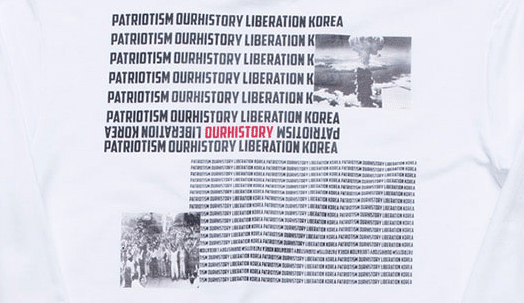BTS, the “atomic bomb shirt,” and South Korean attitudes toward nuclear weapons
By Viet Phuong Nguyen | November 19, 2018
 The T-shirt in question is still available online. Screengrab from ourhistory.co.kr.
The T-shirt in question is still available online. Screengrab from ourhistory.co.kr.
BTS is arguably the biggest K-pop group right now. The seven members of this South Korean boyband were just featured on the cover of the Asian edition of Time magazine, which listed them among the “Next Generation Leaders” with songs that are “taking over the world.” Their latest album, Love Yourself: Answer, was released on August 24 and has already sold more than 2 million copies in South Korea alone – an astounding record in a market of just over 50 million people.
Over the past few weeks, BTS members have found themselves entangled in a bizarre scandal over an “atomic bomb shirt” that led to the cancellation of their appearance on a popular TV Asahi music show in Japan, which has been the main foreign source of revenues for K-pop groups since the 1990s. The 23-year-old singer, Jimin, was caught on the street wearing a white t-shirt bearing the slogan “Patriotism Our History Liberation Korea” repeated in numerous lines and overlapped by a black-and-white picture of the mushroom cloud from the atomic bomb that the United States detonated over Nagasaki, Japan on August 9, 1945.
The Nagasaki bomb, together with the one dropped three days earlier on Hiroshima, killed more than 100,000 people almost instantly and probably more than double that number over time. Many people believe the bombs were the decisive reason that led to Japan’s surrender to the Allies on August 15, 1945 and the liberation of the Korean Peninsula on the same day.
The “atomic bomb shirt” incident occurred amid another difficult episode in the relationship between Japan and South Korea. On November 7, a top South Korean court ordered the Japanese firm Nippon Steel & Sumitomo Metal Corp. to pay compensation for forced Korean labor during the colonization of the Korean Peninsula from 1910 to 1945. Maintaining Japan’s official position that the compensation issue was settled under the 1965 Treaty on Basic Relations between Japan and the Republic of Korea, Japanese Prime Minister Shinzo Abe criticized the ruling as “unbelievable,” suggesting it should be reconsidered by an international court. Therefore, the cancellation of the BTS performance by TV Asahi might be seen as collateral damage from the sporadic but lasting animosity born of imperial Japanese rule of Korea from 1910 to 1945.
But from the viewpoint of people advocating for the nonproliferation and elimination of nuclear weapons, the “atomic bomb shirt” can be seen as evidence of inappropriate attitudes toward nuclear weapons, spread by popular media and held by South Korea’s younger generations. For example, when asked about this incident, Lee Kwang Jae—the chief executive officer of the company that designed the now-infamous t-shirt, still available online at the reasonable price of about $43—said, “I did not include that part to mock Japan. I did it to express the historic truth and timing that after the atomic bomb was detonated, Japan’s unconditional surrender led to independence.” Although he claims to have an interest in history, in making that comment, Kwang did not acknowledge that 10,000 or more Koreans—many conscripted by the Japanese empire as forced labor—also perished in the atomic bombings of Hiroshima and Nagasaki. Of course, people are entitled to the freedom of opinion and expression in a democratic country like South Korea, and celebrating the independence of one’s country is generally a noble undertaking. But it is really troubling to connect such a celebration with an event that caused the deaths of hundreds of thousands of civilians and the horrify suffering of many other victims—the so-called hibakusha, or survivors of the bombings. It is especially ironic for any person from South Korea to glorify nuclear weapons, given that the South has for the past decade been repeatedly threatened with a nuclear attack from its nuclear-capable neighbor, North Korea.
The “atomic bomb shirt” incident is another example of the special attention South Korean people pay to nuclear weapons. In the early 1990s, one of the best-selling books in South Korea was the trilogy Rose of Sharon Has Blossomed (무궁화 꽃이 피었습니다), which romanticized the idea of a North-South unification with the help of nuclear weapons used against Japanese aggressors. Inspired by the life of a Korean nuclear scientist working for the Park Chung-hee government, this trilogy has sold more than 4 million copies, or double the current sale number of the latest album by BTS.
During the early 1970s, President Park Chung-hee did in fact try to secretly develop nuclear weapon capabilities, until the United States shut down the effort. Since the democratization of its political system during the 1980s, South Korea has reassured the United States and the international community of its adherence to the nuclear nonproliferation regime, but public support in South Korea for an indigenous nuclear weapon program remains exceptionally high among non-nuclear-weapon states such as its neighbor Japan. These surveys were often conducted after a North Korean nuclear or missile test, which would naturally affect people’s perceptions. Still, this public preference for nuclear weapons has been cited as a source of concern.
Although South Korea did not vote in favor of the Treaty on the Prohibition of Nuclear Weapons, largely because of its alliance with the nuclear-armed United States, the South Korean government has frequently stated, as its official position, that it would not consider developing nuclear weapons. Such a nuclear-weapon-free principle is essential if South Korea is to continue calling for North Korea to abandon its nuclear weapon program. Also, any South Korean proliferation attempt would undermine its security relationship with the United States and would be uneconomical, given the credible protection it already enjoys from the United States. A South Korean nuclear weapons program could even create a nuclear domino effect leading to other proliferation attempts in the region.
Any commitment by the government of a democratic country like South Korea can only be sustained with a strong public support, which must come from an appropriate understanding of the disadvantages and impracticality of nuclear weapons and the moral unacceptability of the use of such weapons.
Many articles have been written on the first subject (including the 2013 piece, “Why Eliminate Nuclear Weapons?”, by the nonproliferation specialist James E. Doyle, who lost his job at a US nuclear weapons lab not long after its publication). People looking to better understand the morality and devastating impact of nuclear weapons use on victims may consult the recently-published The 2020 Commission Report on the North Korean Nuclear Attacks Against the United States: A Speculative Novel by Jeffrey Lewis, a nuclear expert who uses statements made by hibakusha (and other sources) to describe what might happen to ordinary people in a nuclear war.
The general public may have little interest in reading pay-walled academic papers or novels with long, technical titles. Younger people probably prefer watching the well-produced, well-choreographed music videos of BTS, particularly the ones with catchy titles like “Fake Love” or “Blood Sweat & Tears.” But are entertainers like Jimin and the other members of BTS actually well placed to educate their fans of the significance of nonproliferation for South Korea and the rest of the world? In this situation, it’s best that they put forward an appropriate statement, along the lines of the recent public apology by Big Hit Entertainment—the talent agency representing BTS—which said “We’d like to clarify that all Big Hit staff and artists, including BTS, do not regard war or atomic bombs lightly. We’re against these things, and we have no intention to hurt those who were victims of the atomic bombs.”
Being very popular among young South Koreans and an avid fan of pop culture himself, President Moon Jae-in should take advantage of the “atomic bomb shirt” incident to reiterate the against-nuclear-weapons message to his young supporters, whose votes will be essential for the nonproliferation status of South Korea going forward. It is cool to be a fan of BTS and to celebrate the hard-fought independence of your country. It is also cool to support the international effort to eliminate nuclear weapons.
Together, we make the world safer.
The Bulletin elevates expert voices above the noise. But as an independent nonprofit organization, our operations depend on the support of readers like you. Help us continue to deliver quality journalism that holds leaders accountable. Your support of our work at any level is important. In return, we promise our coverage will be understandable, influential, vigilant, solution-oriented, and fair-minded. Together we can make a difference.
Keywords: BTS, K-pop, South Korea, atomic bomb shirt
Topics: Analysis, Nuclear Weapons















I don’t condone bombing but that bombing have freed so many nations, not only Korea but other parts of Asia. If you visit haunted places in Philippines, they mostly have the history of being the place either used as torture room or hospital for soldier during Japanese invasion. Not to mention, til this day a lot of comfort women are still seeking for justice. History must not be twisted. The oppression and invasion they did to so many other countries led to the bombing. We should not forget that.
this happened two weeks ago let it go. the pictures were from a year ago and it was not intended for it to be offending. they wore it for their korean liberation day so let it go.